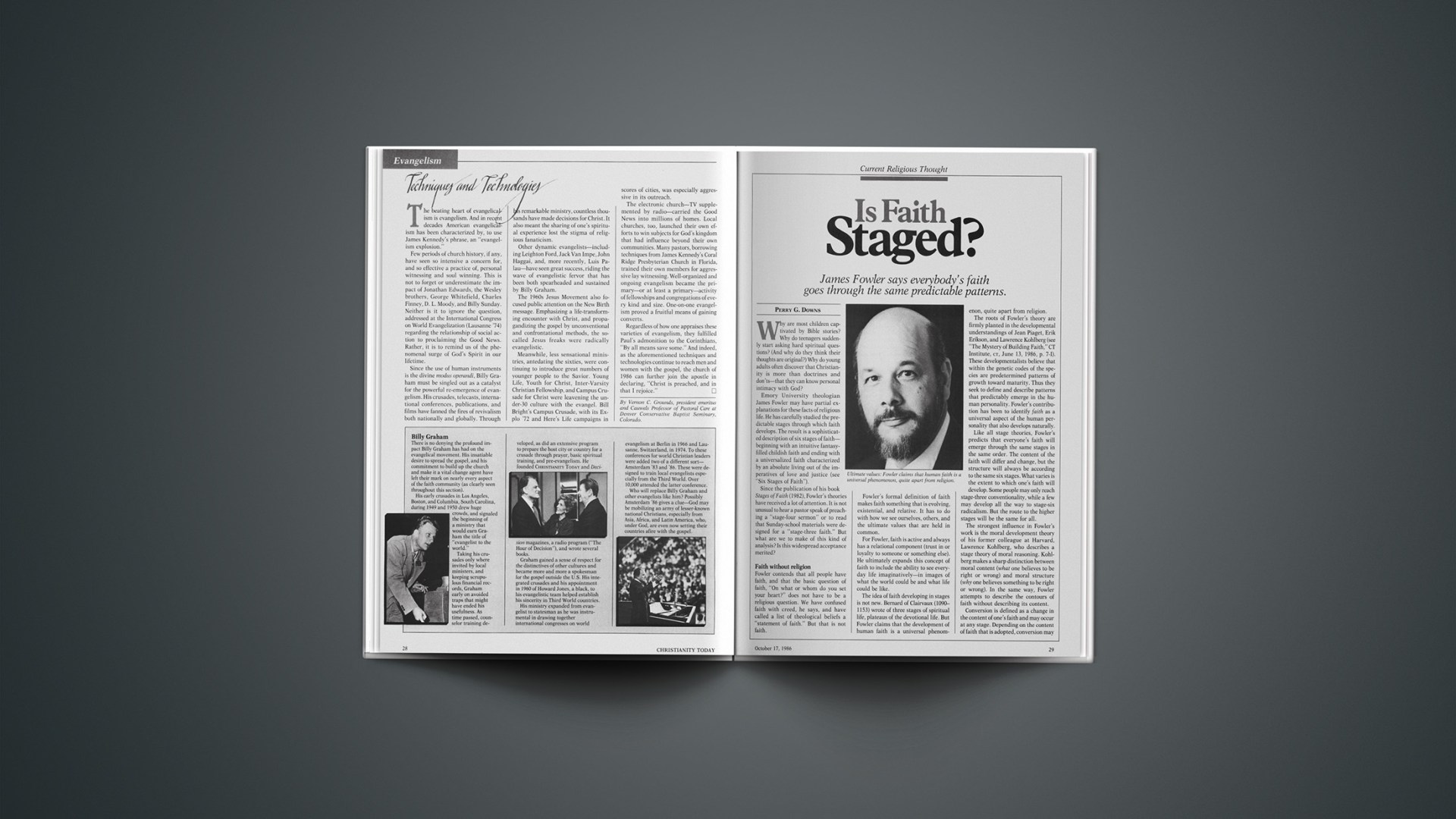The beating heart of evangelicalism is evangelism. And in recent decades American evangelical ism has been characterized by, to use James Kennedy’s phrase, an “evangelism explosion.”
Few periods of church history, if any, have seen so intensive a concern for, and so effective a practice of, personal witnessing and soul winning. This is not to forget or underestimate the impact of Jonathan Edwards, the Wesley brothers, George Whitefield, Charles Finney, D. L. Moody, and Billy Sunday. Neither is it to ignore the question, addressed at the International Congress on World Evangelization (Lausanne ’74) regarding the relationship of social action to proclaiming the Good News. Rather, it is to remind us of the phenomenal surge of God’s Spirit in our lifetime.
Since the use of human instruments is the divine modus operandi, Billy Graham must be singled out as a catalyst for the powerful re-emergence of evangelism. His crusades, telecasts, international conferences, publications, and films have fanned the fires of revivalism both nationally and globally. Through his remarkable ministry, countless thousands have made decisions for Christ. It also meant the sharing of one’s spiritual experience lost the stigma of religious fanaticism.
Other dynamic evangelists—including Leighton Ford, Jack Van Impe, John Haggai, and, more recently, Luis Palau—have seen great success, riding the wave of evangelistic fervor that has been both spearheaded and sustained by Billy Graham.
The 1960s Jesus Movement also focused public attention on the New Birth message. Emphasizing a life-transforming encounter with Christ, and propagandizing the gospel by unconventional and confrontational methods, the so-called Jesus freaks were radically evangelistic.
Meanwhile, less sensational ministries, antedating the sixties, were continuing to introduce great numbers of younger people to the Savior. Young Life, Youth for Christ, Inter-Varsity Christian Fellowship, and Campus Crusade for Christ were leavening the under-30 culture with the evangel. Bill Bright’s Campus Crusade, with its Explo ’72 and Here’s Life campaigns in scores of cities, was especially aggressive in its outreach.
The electronic church—TV supplemented by radio—carried the Good News into millions of homes. Local churches, too, launched their own efforts to win subjects for God’s kingdom that had influence beyond their own communities. Many pastors, borrowing techniques from James Kennedy’s Coral Ridge Presbyterian Church in Florida, trained their own members for aggressive lay witnessing. Well-organized and ongoing evangelism became the primary—or at least a primary—activity of fellowships and congregations of every kind and size. One-on-one evangelism proved a fruitful means of gaining converts.
Regardless of how one appraises these varieties of evangelism, they fulfilled Paul’s admonition to the Corinthians, “By all means save some.” And indeed, as the aforementioned techniques and technologies continue to reach men and women with the gospel, the church of 1986 can further join the apostle in declaring, “Christ is preached, and in that I rejoice.”
By Vernon C. Grounds, president emeritus and Cauwels Professor of Pastoral Care at Denver Conservative Baptist Seminary, Colorado.
Billy Graham
There is no denying the profound impact Billy Graham has had on the evangelical movement. His insatiable desire to spread the gospel, and his commitment to build up the church and make it a vital change agent have left their mark on nearly every aspect of the faith community (as clearly seen throughout this section).
His early crusades in Los Angeles, Boston, and Columbia, South Carolina, during 1949 and 1950 drew huge crowds, and signaled the beginning of a ministry that would earn Graham the title of evangelist to the world.”
Taking his crusades only where invited by local ministers, and keeping scrupulous financial records, Graham early on avoided traps that might have ended his usefulness. As time passed, counselor training developed, as did an extensive program to prepare the host city or country for a crusade through prayer, basic spiritual training, and pre-evangelism. He founded CHRISTIANITY TODAY and Decision magazines, a radio program (“The Hour of Decision”), and wrote several books.
Graham gained a sense of respect for the distinctives of other cultures and became more and more a spokesman for the gospel outside the U.S. His integrated crusades and his appointment in 1960 of Howard Jones, a black, to his evangelistic team helped establish his sincerity in Third World countries.
His ministry expanded from evangelist to statesman as he was instrumental in drawing together international congresses on world evangelism at Berlin in 1966 and Lausanne, Switzerland, in 1974. To these conferences for world Christian leaders were added two of a different sort—Amsterdam ’83 and ’86. These were designed to train local evangelists especially from the Third World. Over 10,000 attended the latter conference.
Who will replace Billy Graham and other evangelists like him? Possibly Amsterdam ‘86 gives a clue—God may be mobilizing an army of lesser-known national Christians, especially from Asia, Africa, and Latin America, who, under God, are even now setting their countries afire with the gospel.










